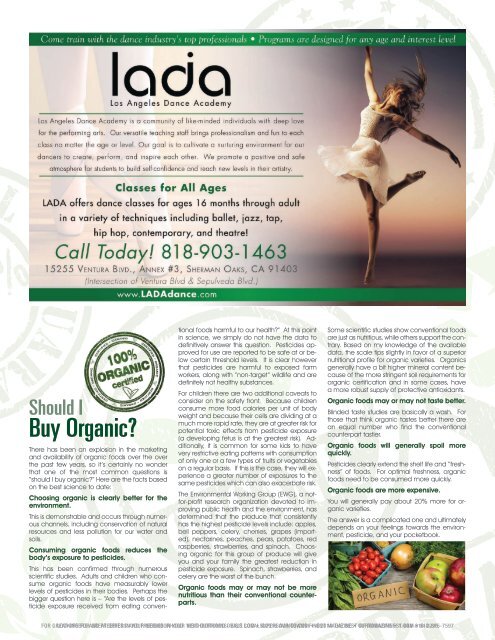You also want an ePaper? Increase the reach of your titles
YUMPU automatically turns print PDFs into web optimized ePapers that Google loves.
Should I<br />
Buy Organic?<br />
There has been an explosion in the marketing<br />
and availability of organic foods over the over<br />
the past few years, so it’s certainly no wonder<br />
that one of the most common questions is<br />
“should I buy organic?” Here are the facts based<br />
on the best science to date:<br />
Choosing organic is clearly better for the<br />
environment.<br />
This is demonstrable and occurs through numerous<br />
channels, including conservation of natural<br />
resources and less pollution for our water and<br />
soils.<br />
Consuming organic foods reduces the<br />
body’s exposure to pesticides.<br />
This has been confirmed through numerous<br />
scientific studies. Adults and children who consume<br />
organic foods have measurably lower<br />
levels of pesticides in their bodies. Perhaps the<br />
bigger question here is – “Are the levels of pesticide<br />
exposure received from eating conventional<br />
foods harmful to our health?” At this point<br />
in science, we simply do not have the data to<br />
definitively answer this question. Pesticides approved<br />
for use are reported to be safe at or below<br />
certain threshold levels. It is clear however<br />
that pesticides are harmful to exposed farm<br />
workers, along with “non-target” wildlife and are<br />
definitely not healthy substances.<br />
For children there are two additional caveats to<br />
consider on the safety front. Because children<br />
consume more food calories per unit of body<br />
weight and because their cells are dividing at a<br />
much more rapid rate, they are at greater risk for<br />
potential toxic effects from pesticide exposure<br />
(a developing fetus is at the greatest risk). Additionally,<br />
it is common for some kids to have<br />
very restrictive eating patterns with consumption<br />
of only one or a few types of fruits or vegetables<br />
on a regular basis. If this is the case, they will experience<br />
a greater number of exposures to the<br />
same pesticides which can also exacerbate risk.<br />
The Environmental Working Group (EWG), a notfor-profit<br />
research organization devoted to improving<br />
public health and the environment, has<br />
determined that the produce that consistently<br />
has the highest pesticide levels include: apples,<br />
bell peppers, celery, cherries, grapes (imported),<br />
nectarines, peaches, pears, potatoes, red<br />
raspberries, strawberries, and spinach. Choosing<br />
organic for this group of produce will give<br />
you and your family the greatest reduction in<br />
pesticide exposure. Spinach, strawberries, and<br />
celery are the worst of the bunch.<br />
Organic foods may or may not be more<br />
nutritious than their conventional counterparts.<br />
Some scientific studies show conventional foods<br />
are just as nutritious, while others support the contrary.<br />
Based on my knowledge of the available<br />
data, the scale tips slightly in favor of a superior<br />
nutritional profile for organic varieties. Organics<br />
generally have a bit higher mineral content because<br />
of the more stringent soil requirements for<br />
organic certification and in some cases, have<br />
a more robust supply of protective antioxidants.<br />
Organic foods may or may not taste better.<br />
Blinded taste studies are basically a wash. For<br />
those that think organic tastes better there are<br />
an equal number who find the conventional<br />
counterpart tastier.<br />
Organic foods will generally spoil more<br />
quickly.<br />
Pesticides clearly extend the shelf life and “freshness”<br />
of foods. For optimal freshness, organic<br />
foods need to be consumed more quickly.<br />
Organic foods are more expensive.<br />
You will generally pay about 20% more for organic<br />
varieties.<br />
The answer is a complicated one and ultimately<br />
depends on your feelings towards the environment,<br />
pesticide, and your pocketbook.<br />
FOR GREAT LOOKING OFFERS FOR AND GREAT FREEBIES OFFERS IN AND YOUR FREEBIES NEIGHBORHOOD IN YOUR VISIT NEIGHBORHOOD OURTOWNSDEALS.COM - VISIT LO<strong>CA</strong>LSUPERSAVINGS.COM • ©2016 OUR TOWNS FINEST • ©2014 MAGAZINE THE BEST • OURTOWNSFINEST.COM OF MAGAZINE • 1-888-816-2295 • 818-875-7597

















